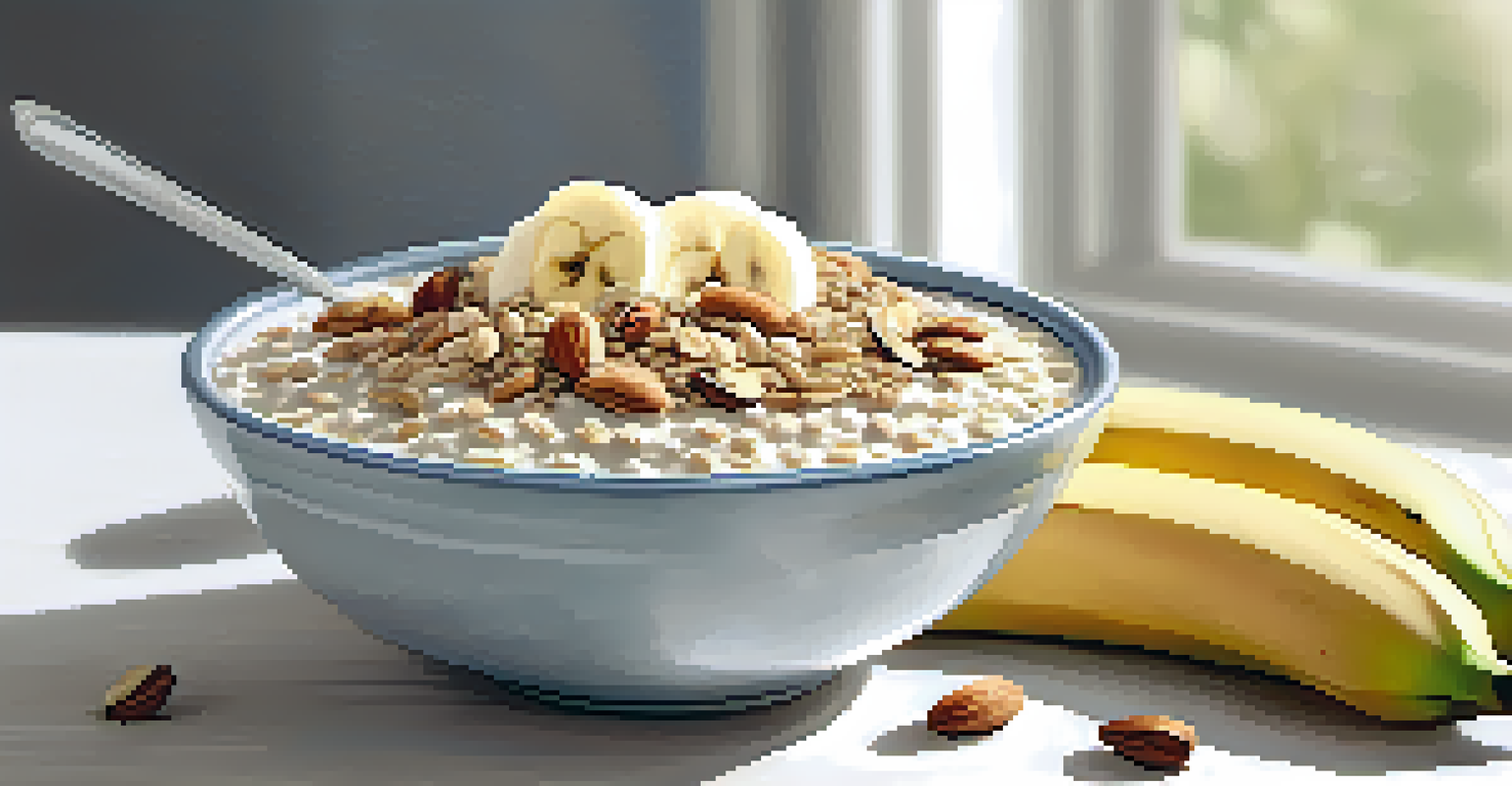Top Vegan Foods That Help Manage Diabetes Effectively

Understanding Diabetes and Plant-Based Diets
Diabetes is a condition that affects how your body processes sugar, leading to high blood sugar levels. Managing diabetes effectively often requires a careful approach to diet. A plant-based diet, rich in whole foods, can offer numerous benefits for those looking to stabilize their blood sugar levels.
Let food be thy medicine and medicine be thy food.
Research shows that vegan diets can improve insulin sensitivity and reduce the risk of complications. By focusing on whole, unprocessed foods, you can help keep your blood sugar levels in check. It’s like choosing to fuel your body with the best possible ingredients for optimal performance.
In this article, we'll explore some of the top vegan foods that can play a vital role in managing diabetes. From leafy greens to legumes, these foods are not only nutritious but also delicious, making them easy to incorporate into your daily meals.
Leafy Greens: Nutrient Powerhouses
Leafy greens like spinach, kale, and Swiss chard are loaded with vitamins and minerals while being low in calories. These greens are also high in fiber, which helps slow down the absorption of sugar into your bloodstream. This quality makes them a fantastic choice for anyone looking to manage their diabetes.

Incorporating leafy greens into your meals can be as simple as tossing them into a smoothie or making a hearty salad. They add volume and nutrition without spiking blood sugar levels. Think of them as the foundation of a healthy plate, providing essential nutrients while keeping things balanced.
Leafy Greens and Legumes are Key
Incorporating leafy greens and legumes provides essential nutrients and fiber, helping to manage diabetes effectively.
Additionally, these greens are rich in antioxidants that may help combat oxidative stress, a factor that can worsen diabetes. By eating a variety of leafy greens, you’re not just managing your blood sugar; you're also supporting overall health.
Legumes: Fiber-Rich and Filling
Legumes, such as lentils, chickpeas, and black beans, are excellent sources of protein and fiber, making them a staple in vegan diets. Their high fiber content helps regulate blood sugar levels by slowing digestion and improving satiety. This means you’re less likely to experience spikes in blood sugar after meals.
The food you eat can be either the safest and most powerful form of medicine or the slowest form of poison.
Adding legumes to your diet can be easy and versatile; you can include them in soups, salads, or even as a main dish. They’re like little powerhouses of nutrition that not only fill you up but also nourish your body. Plus, they come in a variety of flavors and textures, making meal prep exciting.
Research has shown that regular consumption of legumes can help lower fasting blood sugar levels and improve overall diabetes management. So, whether you enjoy them mashed into a dip or tossed into a stew, legumes are a smart choice.
Berries: Sweet and Nutritious
Berries such as blueberries, strawberries, and raspberries are not only delicious but also packed with antioxidants and fiber. These fruits have a lower glycemic index compared to many other fruits, meaning they won't spike your blood sugar levels as quickly. They’re like nature's candy, satisfying your sweet tooth without the guilt.
Incorporating berries into your meals can be as simple as adding them to your morning oatmeal or enjoying them as a snack. Their vibrant colors and flavors make them a delightful addition to any dish. It's an easy way to boost your meal's nutritional profile while satisfying cravings.
Plant-Based Diets Aid Diabetes
A vegan diet rich in whole foods can stabilize blood sugar levels and improve insulin sensitivity.
Moreover, studies have shown that regular consumption of berries can improve insulin sensitivity and reduce inflammation, both of which are crucial for diabetes management. So, next time you’re reaching for a snack, consider grabbing a handful of berries instead.
Whole Grains: Energy and Balance
Whole grains, such as quinoa, brown rice, and oats, are rich in fiber and essential nutrients. Unlike refined grains, whole grains maintain their bran and germ, providing a slower release of carbohydrates into the bloodstream. This helps keep your blood sugar levels stable, making them a smart choice for those managing diabetes.
Incorporating whole grains into your diet is easy; simply swap out white rice for brown or enjoy oatmeal instead of sugary cereals. They add a hearty texture to your meals and can be used in a variety of dishes, from salads to casseroles. Think of them as the sturdy backbone of a balanced meal.
Additionally, whole grains can help reduce the risk of heart disease, a common concern for those with diabetes. By choosing whole grains over processed options, you’re not just making a healthier choice for your blood sugar; you’re also taking care of your heart.
Nuts and Seeds: Healthy Fats for Diabetics
Nuts and seeds are excellent sources of healthy fats, protein, and fiber, making them a great addition to a diabetes-friendly diet. Foods like almonds, walnuts, chia seeds, and flaxseeds can help improve cholesterol levels and promote heart health. They also provide a satisfying crunch that can curb cravings effectively.
Incorporating nuts and seeds into your meals can be as simple as sprinkling them on salads or blending them into smoothies. They add a delightful texture and flavor to your dishes. Think of them as the finishing touch that can elevate your meals while providing additional health benefits.
Berries and Whole Grains for Balance
Berries and whole grains contribute to stable blood sugar levels and overall heart health, making them vital for diabetes management.
Research indicates that including nuts and seeds in your diet can lead to improved blood sugar control and reduced inflammation. So, when you're looking for a snack or a way to enhance your meals, don’t overlook these little nutrient-dense powerhouses.
Avocados: Creamy and Satisfying
Avocados are unique in the fruit world; they’re high in healthy monounsaturated fats and low in sugar. This makes them an ideal choice for those managing diabetes. Their creamy texture not only makes meals more satisfying but also helps regulate blood sugar levels.
Incorporating avocados into your diet can be as easy as spreading them on toast or adding them to salads. They offer a rich flavor that complements a variety of dishes. Think of avocados as a luxurious ingredient that can make healthy eating feel indulgent.

Moreover, avocados have been linked to improved heart health and may help reduce the risk of metabolic syndrome. So, by enjoying this creamy fruit, you’re not just treating your taste buds; you’re also supporting your overall health.
Conclusion: Embracing a Vegan Lifestyle for Diabetes Management
By incorporating these vegan foods into your diet, you can effectively manage your diabetes while enjoying delicious meals. Each of these food groups offers unique benefits that contribute to stable blood sugar levels and overall health. It’s about creating a balanced, nutritious plate that works for your body and your lifestyle.
Transitioning to a vegan diet might seem daunting, but taking small steps can make a significant difference. Start by replacing a few meals a week with plant-based options and gradually explore new recipes and ingredients. It’s like building a new habit; with time, it will become second nature.
Embrace the journey of discovering vibrant, flavorful vegan foods that not only support your diabetes management but also enhance your overall well-being. Remember, every meal is an opportunity to nourish your body and enjoy the process of healthy eating.